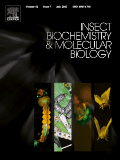
INSECT BIOCHEMISTRY AND MOLECULAR BIOLOGY
Scope & Guideline
Advancing the Frontiers of Insect Science
Introduction
Aims and Scopes
- Biochemical Pathways in Insects:
Research examining the biochemical pathways that govern insect physiology, including metabolism, development, and immune response mechanisms. - Molecular Genetics and Genomics:
Studies focusing on the genetic and genomic basis of insect traits, including gene expression, gene regulation, and the impact of genetic variation on insect behavior and ecology. - Insect-Plant Interactions:
Investigations into the molecular interactions between insects and plants, including the biochemical basis of herbivory, chemical ecology, and plant defense mechanisms. - Insect Physiology and Development:
Research exploring the physiological processes in insects, including hormonal regulation of development, molting, and reproduction. - Insect Pathology and Immunity:
Studies on the immune responses of insects to pathogens and their interactions with microbial communities, including the molecular mechanisms of disease resistance. - Chemical Ecology and Behavior:
Investigations into the chemical signals involved in insect behavior, including pheromones, allelochemicals, and their roles in communication and mating.
Trending and Emerging
- CRISPR and Gene Editing Technologies:
The application of CRISPR and other gene editing technologies is increasingly prevalent, allowing for precise modifications in insect genomes to study gene function and develop pest control strategies. - Metabolomics and Lipidomics:
Emerging studies on the metabolomic and lipidomic profiles of insects are providing insights into their physiological states, responses to environmental changes, and potential applications in pest management. - Environmental Stress Responses:
Research focusing on how insects respond to environmental stressors, such as temperature fluctuations and dietary changes, is gaining importance, particularly in the context of climate change. - Microbiome Interactions:
Investigations into the insect microbiome and its role in health, immunity, and behavior are on the rise, revealing the complex interactions between insects and their microbial partners. - Evolutionary Developmental Biology (Evo-Devo):
The integration of evolutionary and developmental biology approaches is emerging, exploring how developmental processes have evolved and their implications for insect diversity and adaptation.
Declining or Waning
- Traditional Insecticide Resistance Studies:
While insecticide resistance remains a critical issue, the focus on traditional resistance mechanisms is waning in favor of more integrated approaches that consider genetic, ecological, and biochemical interactions. - Basic Taxonomic Studies:
Research primarily aimed at the taxonomic classification of insects is declining as molecular techniques and genomic studies take precedence, providing deeper insights into evolutionary relationships. - Single-Aspect Research:
Studies focusing on isolated aspects of insect biology, such as purely morphological analyses, are becoming less common as interdisciplinary approaches that integrate biochemistry, genetics, and ecology gain traction.
Similar Journals

Frontiers in Insect Science
Advancing the Insect Science FrontierFrontiers in Insect Science is a pioneering open-access journal dedicated to the advancement of knowledge in the field of insect science. Published by FRONTIERS MEDIA SA in Switzerland, this journal serves as a vital platform for researchers, professionals, and students to disseminate high-quality, peer-reviewed research spanning diverse topics within insect biology, ecology, and pest management. Since its establishment in 2021, the journal has gained recognition, ranking in the Q2 category of Insect Science with a Scopus ranking of #92 out of 181 in the field. With a commitment to promoting open access and collaboration, Frontiers in Insect Science is instrumental in fostering innovative research and practical applications essential for combating biodiversity loss and enhancing agricultural sustainability. As a freely accessible resource, it invites contributions that impact both fundamental and applied insect research, connecting a global network of scholars eager to explore the fascinating world of insects.
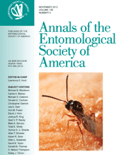
ANNALS OF THE ENTOMOLOGICAL SOCIETY OF AMERICA
Transforming Entomological Research Since 1938ANNALS OF THE ENTOMOLOGICAL SOCIETY OF AMERICA is a premier journal dedicated to advancing the field of insect science, published by Oxford University Press. With an impressive impact factor and classified in the Q1 quartile for its category, this journal ranks among the top publications in agricultural and biological sciences, specifically within insect science, positioned at #28 out of 181, indicating its significant influence and high-quality research contributions. The journal aims to disseminate original research, comprehensive reviews, and groundbreaking findings that enhance our understanding of entomology, spanning across ecological, evolutionary, and applied segments. With a consistent publication history since 1938, researchers, professionals, and students will benefit from the wealth of knowledge presented in its pages. Although the journal does not currently offer open access, it remains a vital resource for those seeking to stay at the forefront of entomological research and innovation.
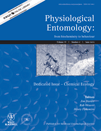
PHYSIOLOGICAL ENTOMOLOGY
Decoding the Dynamics of Insect BehaviorPHYSIOLOGICAL ENTOMOLOGY is a prestigious journal published by WILEY, focusing on the intricate relationships between physiological processes and the ecological and evolutionary dynamics of insects. With an ISSN of 0307-6962 and E-ISSN of 1365-3032, this journal has been at the forefront of insect science since its inception in 1976, contributing significantly to the understanding of insect physiology and behavior. The journal has established itself within the academic community, currently holding a position in the Q2 quartile for both Ecology, Evolution, Behavior and Systematics and Insect Science, highlighting its relevance and impact in these fields. Although there are no Open Access options available, researchers and practitioners can rely on its regular publications to stay abreast of pivotal discoveries and methodologies in insect physiology. With a commitment to advancing the field through rigorous peer-reviewed research, PHYSIOLOGICAL ENTOMOLOGY serves as an essential resource for researchers, professionals, and students alike.
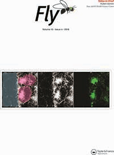
FLY
Elevating Knowledge in the Realm of FliesFLY, an esteemed journal published by Taylor & Francis Inc, is a leading resource in the field of Insect Science, offering cutting-edge research and insights into the biology, ecology, and management of flies and related insect species. With an impressive Impact Factor reflecting its high citation and publication standards, FLY serves as a vital platform for researchers and practitioners aiming to advance their understanding of this diverse and crucial group of organisms. The journal, which has been publishing since 2007 and is set to continue until 2024, is recognized as a Q1 category journal in its discipline, ranked 58 out of 181 in Agricultural and Biological Sciences, placing it in the 68th percentile of the field. Although currently non-open access, the journal is committed to disseminating valuable knowledge and fostering collaboration among scientists, offering unparalleled opportunities for professionals, researchers, and students to engage with transformative science in the insect realm.
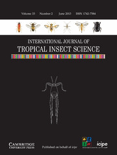
INTERNATIONAL JOURNAL OF TROPICAL INSECT SCIENCE
Uncovering the Secrets of Tropical Insect LifeINTERNATIONAL JOURNAL OF TROPICAL INSECT SCIENCE, published by Springer International Publishing AG, is a leading interdisciplinary journal dedicated to advancing knowledge in the fields of insect science and ecology. With its ISSN 1742-7584 and E-ISSN 1742-7592, this journal provides a platform for researchers to publish high-quality, peer-reviewed articles that explore various aspects of tropical insect biology, behavior, and their ecological impacts. As evidenced by its Q3 ranking in both Ecology, Evolution, Behavior and Systematics and Insect Science, it plays a vital role in fostering scientific dialogue and innovation within these disciplines. Researchers affiliated with the journal benefit from its visibility and growing impact, as demonstrated by its Scopus ranks, with a percentile standing of 61st in Insect Science. Although the journal is not open access, it still reaches a wide academic audience, making significant contributions to our understanding of tropical ecosystems. Situated in Switzerland, this journal is crucial for students, professionals, and researchers invested in the intersection of entomology and ecological science.

CANADIAN ENTOMOLOGIST
Charting New Territories in Insect Evolution and EcologyCanadian Entomologist, published by Cambridge University Press, is a prominent journal dedicated to the field of entomology, covering key areas such as insect science, ecology, and evolutionary biology. With its origins dating back to 1868, this esteemed journal has continuously contributed to the understanding of insect behavior, systematics, and physiology, engaging researchers and professionals alike. Although currently not an Open Access journal, it offers valuable insights through its rigorously peer-reviewed articles, reflecting its commitment to scientific excellence. The journal has garnered a respectable Q3 ranking in various categories, including Ecology, Evolution, Behavior, and Systematics, making it a critical resource for scholars and students who seek to explore the complex interactions within insect populations and their environments. Researchers can trust Canadian Entomologist to provide relevant and impactful research that shapes contemporary understanding in the realm of entomological studies, fostering the growth of this vital scientific discipline.

Insects is a prominent open-access journal published by MDPI, dedicated to advancing research in the vibrant field of insect science. Since its inception in 2011, this journal has become a vital resource for academics and professionals alike, also ranked in the prestigious Q1 category within the Insect Science field by Scopus, achieving a remarkable rank of 26 out of 181 journals. With an ongoing convergence period from 2010 to 2024, Insects provides comprehensive coverage of various aspects of entomology, including but not limited to ecology, behavior, physiology, and applied entomology. Based in Switzerland, the journal promotes an open-access model, ensuring that vital research is readily available to researchers, practitioners, and students globally. This journal not only facilitates the dissemination of groundbreaking entomological research but also fosters collaboration and interdisciplinary dialogue in the field.

EUROPEAN JOURNAL OF ENTOMOLOGY
Showcasing European excellence in insect science.The European Journal of Entomology, published by the Czech Academy of Sciences, Institute of Entomology, is a pivotal journal in the field of Insect Science. With a solid impact factor and recognized ranking—placed in the Q2 quartile in 2023, and ranked #72 out of 181—this journal offers a platform for researchers and professionals alike to share insightful studies and advancements in entomological research. Since its inception in 1993, the journal has continuously evolved to cover a wide spectrum of entomological disciplines, establishing itself as an essential resource for academia and industry. Although it operates on a subscription basis, the journal ensures accessibility for a broad audience of scholars, students, and enthusiasts eager to stay at the forefront of entomological science. Located in Ceske Budejovice, Czech Republic, this journal not only highlights European contributions but also embraces global perspectives, making it an indispensable reference point in the ongoing exploration of insect biology and ecology.
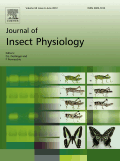
JOURNAL OF INSECT PHYSIOLOGY
Decoding the Complexities of Insect PhysiologyThe Journal of Insect Physiology, an esteemed publication by Pergamon-Elsevier Science Ltd, stands at the forefront of the study of insect biology and physiology. Established in 1957 and set in the United Kingdom, this journal has consistently contributed to advancing our understanding of the intricate physiological processes of insects throughout its converged years ending in 2024. With an impressive impact factor that solidifies its reputation, it ranks in the 1st quartile for Insect Science and the 2nd quartile for Physiology as per the 2023 metrics. The journal's Scopus rankings also reflect its influence, boasting a notable position in both Agricultural and Biological Sciences and Biochemistry, Genetics, and Molecular Biology. Although currently not open access, it provides researchers and professionals with invaluable insights and groundbreaking research essential for the field. With its comprehensive scope, the Journal of Insect Physiology is dedicated to fostering scientific dialogue and innovation, making it an indispensable resource for scholars and students alike.
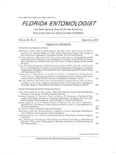
FLORIDA ENTOMOLOGIST
Advancing the Frontiers of Insect ScienceFLORIDA ENTOMOLOGIST is a prestigious peer-reviewed journal dedicated to the advancement of entomological sciences, published by Walter de Gruyter GmbH. Since its transition to open access in 1994, the journal has become a vital resource for researchers, students, and professionals in the fields of Insect Science and Ecology, Evolution, Behavior, and Systematics. With an impact factor ranking high in its category—Q2 in Insect Science and Q3 in Ecology, Evolution, Behavior and Systematics—the journal showcases significant findings and contributions that shape our understanding of insect biology and its implications for ecological systems. The journal is indexed in Scopus, further establishing its relevance, with current rankings reflecting its competitive standing within Agricultural and Biological Sciences. Published continuously since 1982, FLORIDA ENTOMOLOGIST not only facilitates the dissemination of knowledge among entomologists but also encourages interdisciplinary collaboration, making it an essential publication for anyone invested in the scientific study of insects.